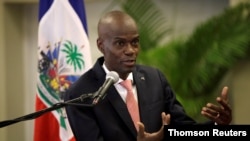President Jovenel Moise will not be stepping down on Feb. 7, Haitian Ambassador Bocchit Edmond told VOA in an exclusive interview Wednesday.
Opposition leaders are calling for nationwide protests in the days leading up to Feb. 7, the day in 1986 when dictator Jean Claude "Baby Doc" Duvalier was overthrown. Feb. 7 is also the date that the Haitian constitution stipulates newly elected presidents be sworn in.
Moise was sworn in on Feb. 7, 2017, for a five-year term, the ambassador noted. But the opposition insists the president's term should end this year.
"They know squarely it is not true because they know the constitution states the president's term lasts five years, and the president was sworn in on Feb. 7, 2017, for five years, which is going to be 2022," Edmond said.
The opposition, which accuses Moise of being a corrupt autocrat who has not done enough to curb the rash of kidnappings that have terrorized the nation, says a transition government should take control of the country after Feb. 7.
Edmond thinks that is a bad idea.
"It is time for Haiti to leave that cycle — that cycle of using illegitimate people to replace elected officials," he told VOA. "Every time we have elections, we have to reverse the electoral votes. We have to ask the president to go, (only) to be replaced by a transitional government, which has never served the good of the Haitian people."
The Moise government's plan is to hold a referendum on a new constitution in April 2021, followed by legislative and presidential elections in September. But the Provisional Electoral Council (KEP) named by the president faces criticism for not being representative of civil society, and the opposition vows to boycott any elections organized by it.
"What about those who want to go to elections? They are also citizens. They have the same rights. That's the issue," Edmond said. "But at the end of the day, what I always invite my fellow citizens to understand (is) we will never have agreement on all the issues. There will always be disagreement. But the most important thing is, let us work on what we agree upon."
But the opposition announced that the nationwide mobilization in all 10 departments of the country will begin Jan. 28-31, followed by a general strike on Feb. 1 and 2, then again on Feb. 7 to force the president to leave power.
“Stop fighting me,” Moise said in a national address earlier this week. “We fight too much. We don’t need to fight against each other. Let’s fight for each other.”
Asked how the Moise government will deal with mass demonstrations on Feb. 7, Edmond reaffirmed the people's right to peacefully protest, as guaranteed by the constitution.
"The government will respect the right of the people to protest peacefully. But any society in any country, whenever protesters are trying to behave in a disorderly manner — burning public goods, burning public property — the police has to step in and put a stop to it," Edmond told VOA. "We will always support the right of the people to protest peacefully on any issue because this is a right recognized by the constitution."
There are concerns, however, about the lack of security and possible attempts by law enforcement to target civilians taking to the streets. Protesters and journalists, including VOA Creole reporters in Port-au-Prince covering the demonstrations, say police often target them with tear gas and behave aggressively toward them, despite no evidence of illegal behavior on their part.
Mario Joseph, a lawyer for the Institute for Justice and Democracy in Port-au-Prince, denounced the national police Wednesday as a "tool of repression." He alleged their goal is to force the people to accept a 2022 presidential departure date.
Joseph said article 134-2 of Haiti's amended constitution states clearly that the president's term will end on Feb. 7, 2021.
"BAI is extremely concerned that the corrupt PHTK (Pati Ayisyen Tet Kale ruling party) government has weaponized the PNH (national police force) to use bullets, (tear) gas, physical aggression, arbitrary arrests and imprisonment to crush popular protests," Joseph said during a press conference Wednesday.
"On the other hand, the government used the PNH to protect the G-9 (gang) militants, who call themselves 'legal bandits' during their protest on January 22, during which they demanded President Moise fire the Social Affairs minister," he said.
Prime Minister Joseph Jouthe replaced Social Affairs Minister Nicole Altidor on Tuesday, announcing the decision on Twitter. But it is unclear if the decision was in direct response to the G-9 protesters’ demand.
Edmond cast doubt on allegations that the national police apply two different standards when moderating protests, but he stopped short of refuting it outright.
"Not being a security expert, I don't want to say anything that could be misinterpreted," he said. …"But what I know (is), whenever the police behave badly, there is always a way to complain through the inspector general's office of the national police."
Looking ahead to Feb. 7, Edmond told VOA the government would only observe the protests as long as they remain peaceful.
Matiado Vilme and Renan Toussaint contributed to this report from Port-au-Prince, Haiti




